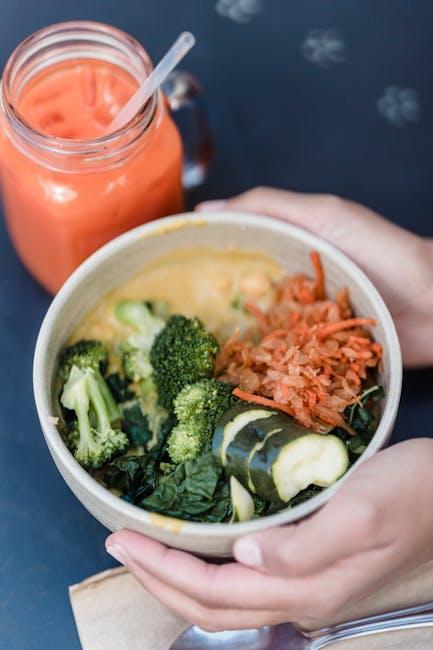In the intricate battlefield of health, our immune system stands as the vigilant guardian, ever ready to defend against unseen invaders. But like any fortress, this defense requires a steady supply of quality fuel to maintain its strength and resilience. Nutrition, often overlooked in the grand strategy of wellness, plays a pivotal role in shaping this immune shield. From vibrant fruits to nourishing proteins, each bite contributes to the complex orchestra that keeps our body’s defenses alert and robust. In understanding the profound connection between diet and immunity, we unlock not just the secrets to preventing illness, but also the empowering knowledge to fortify our well-being from within. This article delves into the vital relationship between what we eat and how our immune system performs, illuminating the path to fueling defense through mindful nutrition.
Table of Contents
- Fueling Defense with Micronutrients Enhancing Immunity through Vitamins and Minerals
- Gut Health and Immunity The Role of Probiotics and Fiber in Strengthening Your Immune System
- Balancing Macronutrients Supporting Immune Function with Proteins, Fats, and Carbohydrates
- Practical Dietary Strategies Daily Habits and Foods to Boost Your Immune Resilience
- Wrapping Up

Fueling Defense with Micronutrients Enhancing Immunity through Vitamins and Minerals
Micronutrients serve as the unsung heroes in the complex machinery of our immune system. Vitamins such as A, C, D, and E provide antioxidant support, boost white blood cell function, and enhance the body’s ability to fend off infections. Minerals like zinc and selenium act as critical cofactors in immune responses, helping to regulate inflammation and maintain the integrity of cellular defenses. These tiny nutritional powerhouses ensure our immune cells are energized, focused, and ready to tackle pathogens effectively.
Incorporating a balanced array of these vital nutrients isn’t just about supplementation; it’s about creating a diverse nutritional environment that supports long-term immunity. Consider foods rich in:
- Vitamin C: Citrus fruits, strawberries, and bell peppers
- Vitamin D: Fatty fish, fortified dairy, and sunlight exposure
- Zinc: Pumpkin seeds, chickpeas, and lean meats
- Selenium: Brazil nuts, eggs, and whole grains
| Micronutrient | Key Immune Role | Top Food Sources |
|---|---|---|
| Vitamin D | Enhances pathogen-fighting cells | Salmon, fortified milk |
| Zinc | Supports white blood cell function | Oysters, legumes |

Gut Health and Immunity The Role of Probiotics and Fiber in Strengthening Your Immune System
Your gut is more than just a digestion hub—it’s a dynamic ecosystem where trillions of microbes work tirelessly to fortify your immune defenses. Probiotics, the beneficial bacteria found in fermented foods and supplements, play a starring role by nurturing this microbiome balance. They help crowd out harmful pathogens while signaling your immune cells to stand guard and respond swiftly. Meanwhile, dietary fiber acts as the essential fuel for these microbes, allowing them to produce short-chain fatty acids that reinforce the gut lining and reduce inflammation. This intricate partnership means that the food choices you make ripple through your immune system, amplifying your body’s natural resilience.
Embracing a diet rich in probiotic and fiber sources offers an accessible toolkit to empower your immune shield:
- Yogurt, kefir, and kimchi introduce live probiotics to refresh your microbial army.
- Whole grains, fruits, and vegetables deliver diverse fibers to sustain healthy gut flora.
- Prebiotic foods like garlic and onions nurture the beneficial bacteria already in residence.
Together, these elements weave a vibrant gut environment that not only supports digestion but also primes your immune system for action—transforming each meal into a deliberate act of defense.

Balancing Macronutrients Supporting Immune Function with Proteins, Fats, and Carbohydrates
Proteins form the cornerstone of your immune cells, empowering your body’s defense with the building blocks it needs for creation and repair. Amino acids, the subunits of protein, are crucial for producing antibodies and signaling molecules that orchestrate immune responses. Including a variety of protein sources—such as lean meats, legumes, dairy, and plant-based options—ensures a steady supply of these vital components. Diversifying your protein intake doesn’t just support cellular fortification; it also creates a robust network ready to respond swiftly to invading pathogens.
Fats are often misunderstood, but the right types are essential for modulating inflammation and maintaining the integrity of cell membranes, the frontline barrier against infection. Omega-3 fatty acids, found in fatty fish, flaxseeds, and walnuts, act as natural regulators, dialing down chronic inflammation that can weaken immune function over time. Carbohydrates, particularly complex ones from whole grains and vegetables, provide energy that powers immune cells in their relentless patrol. Their fiber content also nurtures gut microbiota, the unsung heroes enhancing immune resilience.
| Macronutrient | Immune Function Role | Key Food Sources |
|---|---|---|
| Proteins | Antibody production & cell repair | Chicken, beans, tofu |
| Fats | Inflammation control & membrane health | Salmon, walnuts, olive oil |
| Carbohydrates | Energy & gut microbiota support | Quinoa, spinach, oats |

Practical Dietary Strategies Daily Habits and Foods to Boost Your Immune Resilience
Building a robust immune system isn’t about quick fixes—it’s woven through everyday choices. Prioritize whole, nutrient-dense foods like leafy greens, vibrant berries, and omega-rich fatty fish. These powerhouses deliver vital antioxidants, vitamins, and minerals that support the cellular warriors inside you. Hydration plays a silent yet critical role; drinking enough water ensures your immune cells efficiently flush out toxins and stay alert. Incorporate fermented foods such as yogurt, kimchi, and sauerkraut to nurture gut health, where a significant portion of your immune system resides.
Consistency in your dietary routine is key. Here’s a realistic snapshot of immune-boosting habits to slot into your day:
- Morning: Start with a citrus-packed smoothie rich in vitamin C and zinc.
- Midday: A colorful salad sprinkled with pumpkin seeds and olive oil for glutathione support.
- Evening: Herb-infused teas like ginger or turmeric to calm inflammation and promote recovery.
| Food Group | Key Immune Nutrient | Simple Serving Idea |
|---|---|---|
| Fruits & Vegetables | Vitamin C | Fresh kiwi slices or steamed broccoli |
| Nuts & Seeds | Vitamin E | Handful of almonds or sunflower seeds |
| Lean Proteins | Zinc & Selenium | Grilled chicken breast or lentil stew |
| Fermented Foods | Probiotics | Small bowl of kimchi or natural yogurt |
Wrapping Up
As the intricate dance between nutrients and immunity unfolds, it becomes clear that our plates hold more power than we often realize. Fueling defense is not just a matter of occasional choices but a continuous dialogue between what we eat and how our bodies respond. By embracing a diet rich in diverse, wholesome foods, we don’t just nourish ourselves—we craft a resilient shield, ready to face the unseen challenges each day may bring. In the end, the path to a fortified immune system is as much about mindful nourishment as it is about life itself, inviting us to view every meal as a step toward lasting wellness.



